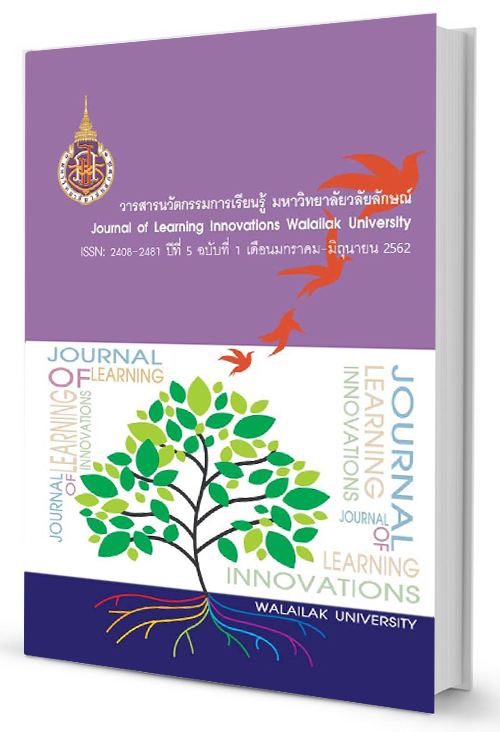Technology Integrated Science Learning
DOI:
https://doi.org/10.14456/jli.2019.3Keywords:
Technological Pedagogical Content Knowledge (TPACK), Teacher preparation, Learning in 21st century, Advance pedagogyAbstract
This article presents lessons learned from 1 research project and 3 learning in 21st century projects. It focuses on technology as a learning tool for pre-service teacher professional development. There were 10 main categories emerged as follows:
- Cloud Based Technology
- Telecommunication technology tools
- Lab simulation application
- Cumulative information or big data
- Video processing technology
- Office application
- Image processing technology
- Augmented Reality
- Tablet and mobile phone application
- Subject matter specific technology
The essential features of these technologies and example learning activities, had been discussed. It is for moving towards teachers’ pedagogy shifts to develop learners in, subject contents and essential skills for living in today's and tomorrow's world.
Keywords: Technological Pedagogical Content Knowledge (TPACK), Teacher preparation,
Learning in 21st century, Advance pedagogy
References
Chamrat, S. (2017a). kānsāng chin ngān nai kān rīan kānsō̜n witthayāsāt bǣp rūammư̄ phān Google Drive nai pramūan sāra chut wichā sư̄ nawattakam læ kān wat læ pramœ̄nphon kān rīanrū witthayāsāt . bandit sưksā sākhā wichā sưksā sāt [Collaborative constructions of artifacts in science teaching and learning through Google Drive in materials, Chapter 9 in innovations, assessment and evaluations in learning science textbook]. School of educational studies. Nonthaburi: Sukhothai Thammathirat Open University Publishing House.
Chamrat, s. (2017b). kān rīanrū thī būranākān rūam kap theknōlōyī. [Technology Integrated Learning]. Faculty of Education, Chiang Mai University. Bangkok: Jaransanitwong Publishing.
Chamrat, s. (2017c). kānsưksā phonkānchai kitčhakam kān rīanrū thī būranākān thammachāt khō̜ng witthayāsāt læ thaksa hǣng satawat thī yīsipʻet thī mī tō̜mnō mati khēmī khō̜ng naksưksā sākhā wichā khēmī Khana Sưksāsāt [The Effects of Learning Activities Integrated the Nature of Science and 21st Century Skills on Chemistry Conceptions of undergraduate Chemistry Major Students in the Faculty of Education Chemistry Major Students’ Chemistry Conceptions, Faculty of Education]. Research report, Faculty of Education, Chiang Mai University.
Chamrat, s. (2017d). rāingān chabap sombūn khrōngkān namrō̜ng kānčhatkān rīanrū bǣp mai thī sō̜tkhlō̜ng kap satawat thī yīsipʻet pra pīkānsưksā sō̜ngphanhārō̜ihāsipkāo [Final report of pilot project of modern learning for 21st century of educational year 2017]. Faculty of Education, Chiang Mai University.
Chamrat, s. (2017e). kānsāng krō̜p nǣokhit kān sư̄pso̜ thāng witthayāsāt phān prawat khō̜ng witthayāsāt [Conceptualization of “Scientific Inquiry” through the history of Science] . Journal of Research Unit on Science, Technology and Environment for Learning, 8(1), 1-14.
Chamrat, s. (2018). rāingān chabap sombūn khrōngkān namrō̜ng kānčhatkān rīanrū bǣp mai thī sō̜tkhlō̜ng kap satawat thī yīsipʻet pra pīkānsưksā sō̜ngphanhārō̜ihāsipkāo [Final report of pilot project of modern learning for 21st century of educational year 2018]. Faculty of Education, Chiang Mai University.
Collier, S., Weinburgh, M. H., & Rivera, M. (2004). Infusing technology skills into a teacher education program: Change in students’ knowledge about and use of technology. Journal of Technology and Teacher Education, 12(3), 447-468.
Eshet-Alkalai, Y. (2004). Digital literacy: A conceptual framework for survival skills in the digital era. Journal of Educational Multimedia and Hypermedia, 13(1), 93.
Institute for the Promotion of Teaching Science and Technology. (2017). tūa chī wat læ sāra kān rīanrū kǣn klāng klum sāra kān rīanrū witthayāsāt ( chabap prapprung Phō̜.Sō̜. sō̜ngphanhārō̜ihoksip ) tām laksūt kǣn klāng kānsưksā naphư̄n thān Phutthasakkarāt sō̜ngphanhārō̜ihāsipʻet [Indicators and core concepts of science subject (B.E.2560 edition) according to Thai basic education core curriculum B.E.2551]. Bangkok: Agriculture Cooperation of Thailand Publishing House.
Interactive Educational Systems Design. (2010). National survey on STEM education special edition for educational leadership network. retrieved from https://www.floridaafterschool.org/pdfs/STEM.pdf
Isaacson, W. (2011). Great innovators e-book boxed set: Steve Jobs, Benjamin Franklin, Einstein. New York: Simon and Schuster.
National Research Council. (2000). Inquiry and the national science education standards. Washington, DC: National Academy Press.
Organisation for Economic Co-operation and Development. (2017). PISA 2015 assessment and analytical framework: Science, reading, mathematic, financial literacy and collaborative problem solving. OECD Publishing.
Princess Chulabhorn Science High School Phitsanulok (2013). Astrobiology. Retrieved from https://www.pccpl.ac.th/pccpl2012/index.php/หน้าแรก/87-หมวดบทความภาษาไทย/2556/195-autrobiology
PSU.Wittayanusorn School. (2018). wī dī ʻōkā rati dō̜tō̜ witthayu rawāng dek Thai kap nakbin ʻawakātsanāsā bon sathānī ʻawakāt nānā chāt ISS [The video of radio communication between Thai students and ESA astronaut from ISS ]. Retrieved from https://www.psuwit.psu.ac.th/index.php/11/297-tt
Thailand Development Research Institute. (2017). khit yok kamlang sō̜ng : thaksa samrap lōk ʻanākhot [Squared thinking: skills for a future world]. Retrieved from https://tdri.or.th/2017/12/ thinkx2-225/
Trilling, B., & Fadel, C. (2012). 21st century skills: Learning for life in our times. John Wiley & Sons.
Downloads
Published
How to Cite
Issue
Section
License
เนื้อหาและข้อมูลในบทความที่ลงตีพิมพ์ในวารสารนวัตกรรมการเรียนรู้ มหาวิทยาลัยวลัยลักษณ์ ถือเป็นข้อคิดเห็นและความรับผิดชอบของผู้เขียนบทความโดยตรง ซึ่งกองบรรณาธิการวารสาร ไม่จำเป็นต้องเห็นด้วย หรือร่วมรับผิดชอบใดๆ
บทความ ข้อมูล เนื้อหา รูปภาพ ฯลฯ ที่ได้รับการตีพิมพ์ในวารสารนวัตกรรมการเรียนรู้ มหาวิทยาลัยวลัยลักษณ์ ถือเป็นลิขสิทธิ์ของวารสารนวัตกรรมการเรียนรุ้ มหาวิทยาลัยวลัยลักษณ์ หากบุคคลหรือหน่วยงานใดต้องการนำทั้งหมดหรือส่วนหนึ่งส่วนใดไปเผยแพร่ต่อเพื่อกระทำการใดๆ จ้อต้องได้รับอนุญาตเป็นลายลักษณ์อักษรจากวารสารนวัตกรรมการเรียนรู้ มหาวิทยาลัยวลัยลักษณ์ก่อนเท่านั้น


